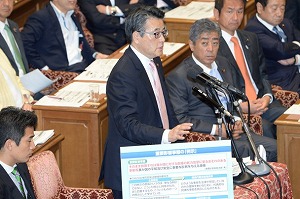|



DPJ President Katsuya Okada
|
On July 10, DPJ President Katsuya Okada represented the party in an interpellatory session of the House of Representatives Special Committee on Legislation for the Peace and Security of Japan and the International Community.
Okada asked a question regarding the difference between “situations that will have an important influence on Japan’s peace and security” as stipulated in the Law to Ensure Security for Situations that will have an Important Influence on Japan’s Peace and Security and “situations where the international community is collectively addressing peace and security” in the International Peace Support Law. Prime Minister Abe replied, “A particular case may potentially fulfill the conditions for both of these situations. In such circumstances we will first consider applying the Law to Ensure Security for Situations that will have an Important Influence on Japan’s Peace and Security. Only if that law does not apply will we decide to apply the conditions of the International Peace Support Law. We will not apply both laws to the same incident at the same time.” Okada pointed out that if the Prime Minister followed his own maxim “there can be no peace and security for Japan without peace and security for the world” the majority of cases may have to be dealt with as situations that will have an important influence on Japan’s peace and security, and the scope for applying the International Peace Support Law would in practice be limited.
With regard to situations that threaten Japan’s survival in which the government states that it would be possible to use the right to collective self-defense, Okada cited the example of U.S. vessels transporting Japanese citizens, saying, “In the case of the right to individual self-defense, the concept of defense mobilization exists and there is a two-stage process under which the use of force cannot be engaged in until the opponent has actually launched an attack. But in such a case [of U.S. vessels transporting Japanese citizens] is there anything that would correspond to the concept of waiting for an enemy attack to be launched under the right to individual self-defense? How far would the situation need to develop before it would be possible to use force?” The Prime Minister’s answer did not stick to the point, however, and Okada called on the government to clarify their stance and explain properly. He expressed strong concerns, saying, “The question of whether defense mobilization should take place or not, of whether the SDF should use force, is the core of the legislative proposal. Defense mobilization, the use of force, such acts amount to Japan waging war. This point impacts upon the lives and livelihoods of the Japanese people. I have been saying that we need to clarify this extremely important concept, but the Prime Minister’s response was rambling and incomprehensible. Can you really protect the livelihoods of the Japanese people in such a fashion?”
Okada also referred to the issue of logistic support, citing then Minister of Defense Kyuma’s comments in a 2007 session of the House of Councillors Committee on Foreign Affairs and Defense stating that transport operations carried out by the Air SDF in Baghdad “were extremely dangerous”. He said that the government’s explanation at the time of the operation and the actual conditions were different, and stressed that the facts about the actual situation were necessary when discussing whether to eliminate non-combat zones. Okada called for disclosure of information, commenting “Proper information disclosure regarding logistic support is a precondition for introducing and discussing new concepts.”
|

